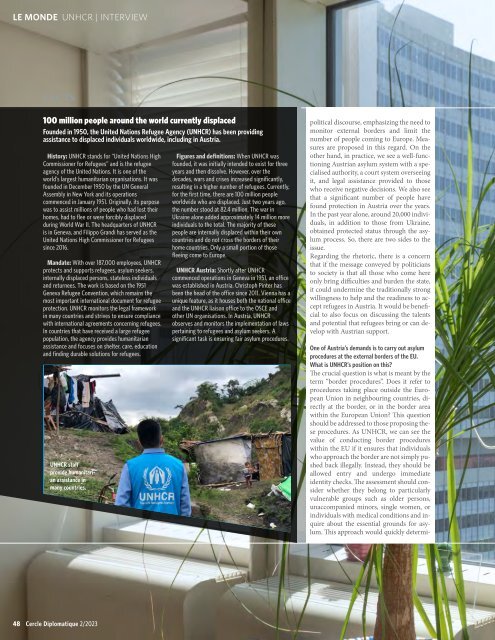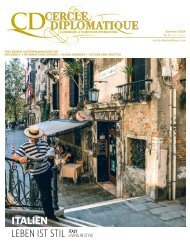CERCLE DIPLOMATIQUE - issue 02/2023
CD is an independent and impartial magazine and is the medium of communication between foreign representatives of international and UN-organisations based in Vienna and the Austrian political classes, business, culture and tourism. CD features up-to-date information about and for the diplomatic corps, international organisations, society, politics, business, tourism, fashion and culture. Furthermore CD introduces the new ambassadors in Austria and informs about designations, awards and top-events. Interviews with leading personalities, country reports from all over the world and the presentation of Austria as a host country complement the wide range oft he magazine.
CD is an independent and impartial magazine and is the medium of communication between foreign representatives of international and UN-organisations based in Vienna and the Austrian political classes, business, culture and tourism. CD features up-to-date information about and for the diplomatic corps, international organisations, society, politics, business, tourism, fashion and culture. Furthermore CD introduces the new ambassadors in Austria and informs about designations, awards and top-events. Interviews with leading personalities, country reports from all over the world and the presentation of Austria as a host country complement the wide range oft he magazine.
You also want an ePaper? Increase the reach of your titles
YUMPU automatically turns print PDFs into web optimized ePapers that Google loves.
LE MONDE UNHCR | INTERVIEW<br />
FACTS<br />
100 million people around the world currently displaced<br />
Founded in 1950, the United Nations Refugee Agency (UNHCR) has been providing<br />
assistance to displaced individuals worldwide, including in Austria.<br />
History: UNHCR stands for “United Nations High<br />
Commissioner for Refugees” and is the refugee<br />
agency of the United Nations. It is one of the<br />
world’s largest humanitarian organisations. It was<br />
founded in December 1950 by the UN General<br />
Assembly in New York and its operations<br />
commenced in January 1951. Originally, its purpose<br />
was to assist millions of people who had lost their<br />
homes, had to flee or were forcibly displaced<br />
during World War II. The headquarters of UNHCR<br />
is in Geneva, and Filippo Grandi has served as the<br />
United Nations High Commissioner for Refugees<br />
since 2016.<br />
Mandate: With over 187,000 employees, UNHCR<br />
protects and supports refugees, asylum seekers,<br />
internally displaced persons, stateless individuals<br />
and returnees. The work is based on the 1951<br />
Geneva Refugee Convention, which remains the<br />
most important international document for refugee<br />
protection. UNHCR monitors the legal framework<br />
in many countries and strives to ensure compliance<br />
with international agreements concerning refugees.<br />
In countries that have received a large refugee<br />
population, the agency provides humanitarian<br />
assistance and focuses on shelter, care, education<br />
and finding durable solutions for refugees.<br />
UNHCR staff<br />
provide humanitarian<br />
assistance in<br />
many countries.<br />
Figures and definitions: When UNHCR was<br />
founded, it was initially intended to exist for three<br />
years and then dissolve. However, over the<br />
decades, wars and crises increased significantly,<br />
resulting in a higher number of refugees. Currently,<br />
for the first time, there are 100 million people<br />
worldwide who are displaced. Just two years ago,<br />
the number stood at 82.4 million. The war in<br />
Ukraine alone added approximately 14 million more<br />
individuals to the total. The majority of these<br />
people are internally displaced within their own<br />
countries and do not cross the borders of their<br />
home countries. Only a small portion of those<br />
fleeing come to Europe.<br />
UNHCR Austria: Shortly after UNHCR<br />
commenced operations in Geneva in 1951, an office<br />
was established in Austria. Christoph Pinter has<br />
been the head of the office since 2011. Vienna has a<br />
unique feature, as it houses both the national office<br />
and the UNHCR liaison office to the OSCE and<br />
other UN organisations. In Austria, UNHCR<br />
observes and monitors the implementation of laws<br />
pertaining to refugees and asylum seekers. A<br />
significant task is ensuring fair asylum procedures.<br />
political discourse, emphasizing the need to<br />
monitor external borders and limit the<br />
number of people coming to Europe. Measures<br />
are proposed in this regard. On the<br />
other hand, in practice, we see a well-functioning<br />
Austrian asylum system with a specialised<br />
authority, a court system overseeing<br />
it, and legal assistance provided to those<br />
who receive negative decisions. We also see<br />
that a significant number of people have<br />
found protection in Austria over the years.<br />
In the past year alone, around 20,000 individuals,<br />
in addition to those from Ukraine,<br />
obtained protected status through the asylum<br />
process. So, there are two sides to the<br />
<strong>issue</strong>.<br />
Regarding the rhetoric, there is a concern<br />
that if the message conveyed by politicians<br />
to society is that all those who come here<br />
only bring difficulties and burden the state,<br />
it could undermine the traditionally strong<br />
willingness to help and the readiness to accept<br />
refugees in Austria. It would be beneficial<br />
to also focus on discussing the talents<br />
and potential that refugees bring or can develop<br />
with Austrian support.<br />
PHOTOS: XYXXYXYXY<br />
PHOTOS: RALPH MANFREDA<br />
One of Austria’s demands is to carry out asylum<br />
procedures at the external borders of the EU.<br />
What is UNHCR’s position on this?<br />
The crucial question is what is meant by the<br />
term “border procedures”. Does it refer to<br />
procedures taking place outside the European<br />
Union in neighbouring countries, directly<br />
at the border, or in the border area<br />
within the European Union? This question<br />
should be addressed to those proposing these<br />
procedures. As UNHCR, we can see the<br />
value of conducting border procedures<br />
within the EU if it ensures that individuals<br />
who approach the border are not simply pushed<br />
back illegally. Instead, they should be<br />
allowed entry and undergo immediate<br />
identity checks. The assessment should consider<br />
whether they belong to particularly<br />
vulnerable groups such as older persons,<br />
unaccompanied minors, single women, or<br />
individuals with medical conditions and inquire<br />
about the essential grounds for asylum.<br />
This approach would quickly determine<br />
whether the asylum claim is credible and<br />
warrants a positive assessment. If protection<br />
is not granted, then a return to the country<br />
of origin can be considered.<br />
I assume that you don’t find the idea of<br />
conducting asylum procedures in faraway<br />
countries like Rwanda convincing.<br />
No, we cannot endorse such ideas for various<br />
reasons. We do not object to states coming<br />
together to discuss how best to address<br />
the refugee <strong>issue</strong> collectively. However, we<br />
criticize the British proposals because they<br />
appear to be shifting responsibility rather<br />
than sharing it. Additionally, Rwanda is a<br />
country that already hosts a significant<br />
number of refugees and has a relatively<br />
young and fragile asylum system. This raises<br />
the question of who would conduct the<br />
procedures there and what quality standards<br />
would be in place.<br />
The European Commission has long been trying to<br />
formulate and implement a common asylum<br />
policy, but it has had little success. Is it due to a<br />
lack of solidarity or is the fundamental idea<br />
flawed?<br />
I believe it’s a bit of both. On the one hand,<br />
we see that EU member states have very different<br />
views on the <strong>issue</strong>. There are some<br />
countries that believe we should simply focus<br />
on preventing or minimizing the arrival<br />
of refugees in Europe. On the other hand,<br />
there are those who believe we have a responsibility<br />
to ensure global refugee protection<br />
and should contribute to it by establishing<br />
good rules together, in a spirit of<br />
solidarity. These blocks can be further divided<br />
into different sub-blocks, and they<br />
struggle to come together to make meaningful<br />
decisions. As UNHCR, we believe<br />
that the European Commission’s proposals<br />
could serve as a viable basis for<br />
discussion if all parties were willing to<br />
approach them with some degree of convergence.<br />
It is possible to find a solution<br />
that aligns with human rights and international<br />
refugee law. However, as UNHCR,<br />
we are merely observers and convey our<br />
recommendations and goals. Ultimately, it<br />
48 Cercle Diplomatique 2/2<strong>02</strong>3 Cercle Diplomatique 2/2<strong>02</strong>3 49
















